Action for Primates
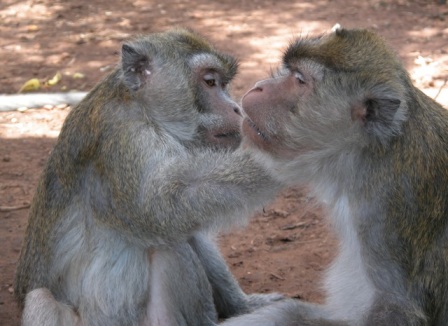
|
Action for Primates |

|
|
The following are news items we have posted in 2023. See elsewhere for news from other years.
Index of news items; select date & title to access:
22 December 2023: Wisconsin pharmacist jailed for his role in horrifying online baby monkey torture gangs
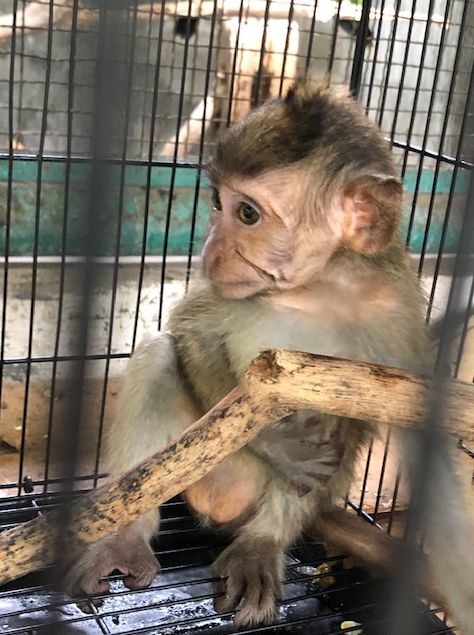
Action for Primates and Lady Freethinker have welcomed the sentencing of Wisconsin, USA, pharmacist Kenneth Herrera for his role in online monkey torture gangs, paying for and dictating the brutal torture and killing of baby monkeys in Indonesia. Herrera was sentenced to a year in prison, fined $5,000 US and ordered to serve three years of supervised release following his prison sentence.
Herrera was cited under the Preventing Animal Cruelty and Torture Act, which makes it illegal to cause the creation or distribution of depictions of animal crushing
. The charge stated Herrera had messaged a video maker in Indonesia, asking that they use a hammer to break a juvenile monkey's hands, arms and feet, and use pliers to pick the animal up by his genitals and smash him to the ground. He also requested that the video operator use a hammer to crack him on the head
, among other abuses.
According to news reports, US District Judge William Conley stated: Except for the abuse of a child, I don't know if I've ever been presented with a more disturbing video.
Other individuals have been charged by Federal authorities in connection to online monkey torture gangs and the production of videos.
Action for Primates and Lady Freethinker have been investigating the disturbing world of online monkey torture gangs for over two years and identified Herrera to law enforcement. The evidence uncovered by the animal groups, including videos and screenshots of chats from Herrera and other gang members, was handed over to the US authorities. The groups continue to investigate and work to end the horrifying violence inflicted upon baby monkeys for online circulation by publishing reports, communicating directly with social media platforms, and researching and sending intelligence and information to law enforcement.
Sarah Kite, co-founder, Action for Primates, stated: We welcome the imprisonment of this individual. Those involved in the horrifying torture and killing of baby monkeys must be held to account, and others deterred from taking part in such perverted and sadistic behaviour. We hope that this sentencing will send a clear message: that there are legal consequences for those who take part in these atrocities.
Nina Jackel, president and founder of Lady Freethinker, stated: Paying for the torture and killing of baby monkeys for online 'entertainment' – or for any reason – is appalling and must never be tolerated. We are relieved that this individual, who is responsible for unimaginable cruelty, has been sentenced to prison, and hope it will deter others from carrying out similar sadistic acts.
Monkey torture online was also the focus of a recent BBC documentary, The monkey haters, which highlighted the use of social media in a global monkey torture ring producing, sharing and selling online monkey torture content, and spanning from Indonesia to the United States. Videos included monkeys having parts of their body cut off or their bones broken; the animals crammed into small jars of water and forcefully held down; and others where macaques' eyes were drilled out with a power tool.
Action for Primates and Lady Freethinker are also urging social media platforms and messaging platforms, such as YouTube, Facebook and Telegram, to do more to prevent videos showing monkeys being tortured and killed from spreading on their platform. Lady Freethinker have also launched a petition: Remove Animal Cruelty From Facebook. A new report – Monkey Abuse on Social Media – published by the animal groups, reveals that the world's top social media platforms are allowing content to be posted and shared on their platforms. This content shows infant macaques being brutally tortured, including having parts of their bodies, including limbs, genitals, fingers and toes, cut off; being set alight; strangled; drowned; and killed in other ways. The majority of this content was found on Facebook.
17 November 2023: CITES recommends trade suspension in CITES-listed species from Lao PDR
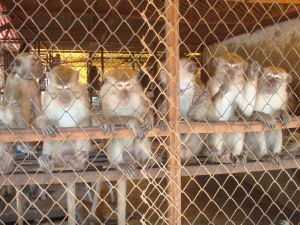
A recommendation to suspend all commercial trade in CITES-listed species from Lao PDR was made at the recent 77th Standing Committee meeting for CITES (Convention on International Trade of Endangered Species of Wild Fauna and Flora). This suspension, which includes the CITES Appendix II listed long-tailed macaque, follows several years during which Lao PDR has failed to improve legislation and enforcement regarding the illegal wildlife trade, and will remain until the country has substantially achieved a list of recommendations. The CITES Secretariat is also investigating the legal acquisition of founder animals for macaque breeding facilities in Lao PDR.
Action for Primates welcomes this recommendation. For several years, Lao PDR was previously subjected to a CITES trade suspension for long-tailed macaques because of concerns raised about the trade from the country. This followed the export of many thousands of macaques to China and Vietnam for the research and toxicity (poisoning) testing industry. Lao PDR, however, resumed exporting monkeys in 2020, with an export quota set for 3,000 individuals each year for 2020 and 2021, followed by a doubling of quota to 6,000 for 2022, and an alarming increase to 7,800 for 2023.
The 2022 assessment of the conservation status of the long-tailed macaque as Endangered for the IUCN Red List of Threatened Species has also raised serious concerns about the population of the species across its range. One of the countries of concern is Lao PDR where the presence of wild long-tailed macaques is uncertain, with reports that only about 300 to 500 monkeys are living in the protected areas in the country.
At the CITES Animals Committee meeting held in June 2023, recommendations that the long-tailed macaque be included in a review into the breeding and trade in long-tailed macaques in Cambodia, Indonesia, Vietnam, and the Philippines, were accepted. Action for Primates has worked with others, including the Species Survival Network, Born Free Foundation, Long-Tailed Macaque Project, International Primate Protection League and Asia for Animals Coalition, to push for greater conservation protection for the long-tailed macaque, raising concerns about the credibility of captive-breeding claims, the conservation status of the species and the impacts of increasing international trade on that status. Although an end to this trade is our goal, it is at least encouraging that concerns surrounding the credibility of captive-breeding claims have been recognised as an issue by CITES, and that the trade in these countries will now be put under scrutiny.
7 November 2023: Wild-caught marmosets killed to test 'cocaine vaccine' in Brazil
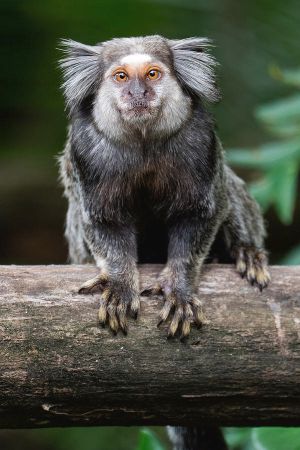
Reports of researchers in Brazil working on a vaccine for cocaine addiction have appeared in the news media (euronews.com 2023). Tragically, this research is involving non-human animals, including wild non-human primates. In one experiment, five wild black-tufted marmosets (Callithrix penicillata), living freely in the forests of Brazil, were captured and seized by the Brazilian Institute of Environment and Renewable Natural Resources and donated
to the Universidade Federal de Minas Gerais (UFMG). Researchers at that university then used the three females and two males as preclinical models
for humans in toxicity testing for the anti-cocaine vaccine
(Sabato et al 2023). The project was approved by the Local Ethics Committee
.
The marmosets were given the test vaccine intramuscularly several times over a 42 day period. Blood was regularly taken from the femoral vein (the major vein in the leg). Although the researchers claimed there were no problems from the injections, they stated that the injection sites showed inflammation and other damage (induration [thickening], erythema, edema, eschar [necrotic tissue], and necrosis [rotting of tissue]
).
At the end of the test period, the marmosets were anaesthetised and then bled to death; their bodies dissected and organ and tissue samples taken.
The aim of the research was to show that the anti-cocaine vaccine being developed would not only produce antibodies against cocaine, but also would be safe for use. To Action for Primates, the research appeared to be a quick and 'half-hearted' test carried out on conveniently available monkeys, to tick a box on a form before the vaccine went into clinical trials. Even if the vaccine could be effective in humans, there is no way to determine its safety by testing in marmosets. Moreover, as acknowledged by the authors, far too few marmosets – just five – were used to make any definitive conclusions and there were no controls to rule out spurious results. The marmosets were ripped from their forest homes and families; subjected to extreme fear, not only from being captured, but also from being incarcerated in the laboratory; endured multiple and painful injections and blood sampling; and death...for information that cannot reliably be extrapolated to humans. This inhumane attempt at trying to find a 'silver bullet' treatment for substance abuse is morally unconscionable as well as ineffective. The complex combination of factors at play, such as genetics, emotional and personal experiences and socioeconomic aspects, can never be simulated or resolved through non-human primate research. Substance abuse involving cocaine or other drugs is a purely human issue and cannot be addressed using non-human primates or any other non-human animal.
Black-tufted marmosets, also known as black-pencilled marmosets, live in the forests of Brazil, are arboreal and almost never descend to the ground. A highly social species, they live in family groups and spend their days travelling to find food, resting, playing and grooming themselves or each other. They are on the International Union for the Conservation of Nature (IUCN) Red List of Threatened Species (Valle et al 2021). Although assessed as Least Concern
by the IUCN, the species is in decline: ...although widespread and hardy, and able to survive in extremely degraded habitats, populations of this species have disappeared or are declining in many parts of its range. Threats include deforestation and fragmented habitat, hunting for pets, and hybridisation.
References:
20 September 2023: UK Online Safety Bill passes: measures to tackle animal cruelty content included
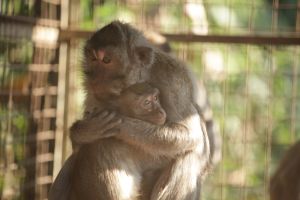
Action for Primates has welcomed the inclusion of measures to tackle animal torture and cruelty content within the Online Safety Bill, which has passed its final Parliamentary debate and is now ready to become law. Under the new legislation, animal torture content is classified as a priority offence, raising it to the same class as other types of content like child sexual abuse, threats to kill and revenge pornography. Social media companies will be required to remove such content or face stiff fines. The legislation also covers animal abuse that takes place outside the UK, but which is accessible by users in the UK, part of a zero-tolerance approach. We are grateful to Baroness Merron, Baroness Hayman, Lord Clement-Jones and the other peers in the House of Lords for pushing to have animal cruelty content specifically included in the scope of the Bill. Thank you also to everyone who has supported our campaign and contacted their MPs and the UK government.
This marks a major achievement and, we hope, will represent a turning point in ridding social media platforms of the horrifying and disturbing content involving the torture and killing of animals, including baby monkeys, for online 'entertainment'. Action for Primates has campaigned extensively on this issue, and joined with other animal protection and wildlife organisations from the UK and across the globe, including the Wildlife and Countryside Link and Asia for Animals Coalition (SMACC), to push for animal cruelty content to be brought within the scope of the Bill. The recent escalation in the violence inflicted upon baby monkeys in videos posted on social media platforms such as Facebook, is unconscionable.
The BBC documentary, The monkey haters, was cited by the government as an example of the way in which social media can be used to facilitate animal torture. The programme highlighted the use of social media in global monkey torture rings producing, sharing and selling online monkey torture content, spanning from Indonesia to the United States and the UK. The documentary received worldwide attention, including reports on the arrest and release under investigation of three people in the UK, suspected of being members of a monkey torture group involved in the production and distribution of animal abuse content on social media. This put the UK in the spotlight, and demonstrated the shocking escalation in extreme animal cruelty content that is now widely available on social media platforms, and easily accessible by anyone, including children and vulnerable adults.
Action for Primates and Lady Freethinker have been investigating the disturbing world of online monkey cruelty for three years. In 2021, we released our harrowing findings, revealing a disturbing escalation of violence and abuse directed at monkeys and published online. The evidence uncovered, including videos and screenshots of chats from members of this monkey torture group, was handed over to law enforcement agencies in several countries, and arrests have followed (see news items 21 December 2022 and 24 August 2023). Together with Lady Freethinker and Jakarta Animal Aid Network (JAAN), we also provided information and intelligence to the BBC journalists for their investigation and documentary.
Action for Primates and Lady Freethinker are continuing with their investigations and working with others to track down individuals involved in these depraved and sadistic activities.
Mini (whose photo is above), Milo and Unyil are three long-tailed macaques who were rescued in Indonesia during the BBC investigation into the global online monkey torture gangs. They are now safe at the Sumatra Wildlife Center, and free from the torment and cruelty to which they were being subjected. It is hoped that they can eventually be released with others into a protected reserve to live the rest of their lives freely. Please consider donating towards the care and rehabilitation of these monkeys and the other rescued wild animals at the Sumatra Wildlife Center:
https://sumatrawildlifecenter.com
@sumatrawildlifecenter
15 September 2023: UK Online Safety Bill: Animal torture content to be removed from social media platforms

Action for Primates has welcomed the government's recent announcement to include animal cruelty content within the scope of the UK Online Safety Bill. Under new proposals, animal torture content will now be classified in the Bill as a priority offence, raising it to the same class as other types of content like child sexual abuse, threats to kill and revenge pornography. Social media companies will be required to remove such content or face stiff fines. The scope of the amendment also covers animal abuse that takes place outside the UK, but which is accessible by users in the UK, part of a zero-tolerance approach. The Bill has now returned to the House of Commons for the consideration of MPs. We are grateful to Baroness Merron, Baroness Hayman, Lord Clement-Jones and the other peers in the House of Lords for pushing to have animal cruelty content specifically included in the scope of the Bill. Thank you also to everyone who has supported our campaign and contacted their MPs and the UK government.
This new amendment is a major achievement and, if accepted by MPs, could represent a turning point in ridding social media platforms of the horrifying and disturbing content involving the torture and killing of animals, including baby monkeys, for online 'entertainment'. Action for Primates has campaigned extensively on this issue, and joined with other animal protection, wildlife and anti-trafficking organisations from the UK and across the globe, including the Wildlife and Countryside Link and Asia for Animals Coalition (SMACC), to push for animal cruelty content to be brought within the scope of the Bill. The recent escalation in the violence inflicted upon baby monkeys in videos posted on social media platforms such as Facebook, is unconscionable.
The BBC documentary, The monkey haters, was cited by the government as an example of the way in which social media can be used to facilitate animal torture. The programme highlighted the use of social media in global monkey torture rings producing, sharing and selling online monkey torture content, spanning from Indonesia to the United States and the UK. The documentary received worldwide attention, including reports on the arrest and release under investigation of three people in the UK, suspected of being members of a monkey torture group involved in the production and distribution of animal abuse content on social media. This put the UK in the spotlight, and demonstrated the shocking escalation in extreme animal cruelty content that is now widely available on social media platforms, and easily accessible by anyone, including children and vulnerable adults.
Action for Primates and Lady Freethinker have been investigating the disturbing world of online monkey cruelty for three years. In 2021, we released our harrowing findings, revealing a disturbing escalation of violence and abuse directed at monkeys and published online. The evidence uncovered, including videos and screenshots of chats from members of this monkey torture group, was handed over to law enforcement agencies in several countries, and arrests have followed (see news items 21 December 2022 and 24 August 2023). Together with Lady Freethinker and Jakarta Animal Aid Network (JAAN), we also provided information and intelligence to the BBC journalists for their investigation and documentary.
Action for Primates and Lady Freethinker are continuing with their investigations and working with others to track down individuals involved in these depraved and sadistic activities.
Mini (whose photo is above), Milo and Unyil are three long-tailed macaques who were rescued in Indonesia during the BBC investigation into the global online monkey torture gangs. They are now safe at the Sumatra Wildlife Center, and free from the torment and cruelty to which they were being subjected. It is hoped that they can eventually be released with others into a protected reserve to live the rest of their lives freely. Please consider donating towards the care and rehabilitation of these monkeys and the other rescued wild animals at the Sumatra Wildlife Center: https://sumatrawildlifecenter.com; @sumatrawildlifecenter
24 August 2023: US law enforcement takes further action against those involved in online monkey torture
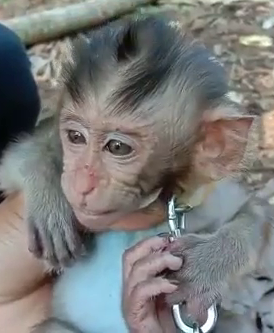
Animal protection groups Action for Primates and Lady Freethinker have welcomed the prosecution of Wisconsin resident Kenneth Herrera – who the groups identified to law enforcement – for paying a video operator in Indonesia to brutally torture a baby macaque on camera.
The federal animal crushing charge was detailed in a plea agreement, which states Herrera had messaged a video maker in Indonesia asking that they use a hammer to break a juvenile monkey's hands, arms and feet, and use pliers to pick the animal up by his genitals and smash him to the ground. He also requested that the video operator use a hammer to "crack him on the head," among other abuses.
Records state that ten video files showing the macaque being tortured were later sent to Herrera, who has admitted to paying for the films to be made.
Lady Freethinker and Action for Primates first exposed the setting up of private online groups to order and pay for the making of videos depicting the horrifying torture and killing of baby monkeys in 2021 (Monkey Haters). They have continued to investigate and work to end it by publishing reports, communicating directly with social media platforms and by researching and sending information to law enforcement officials.
Sarah Kite, co-founder of Action for Primates, stated: We are grateful for this action taken by law enforcement. Those involved in the horrifying torture and killing of baby monkeys must be held to account, and others deterred from taking part in such perverted and sadistic behaviour. We hope that this action will send a clear message – that there are legal consequences for those who take part in these atrocities.
Nina Jackel, president and founder of Lady Freethinker, stated: Paying for the torture and killing of baby monkeys for online 'entertainment' – or for any reason – is appalling and must never be tolerated. We are relieved that this individual, who is responsible for unimaginable cruelty, was prosecuted, and hope it will deter others from carrying out similar sadistic acts.
Monkey torture online was also the focus of a recent BBC documentary, The monkey haters, which highlighted the use of social media in a global monkey torture ring producing, sharing and selling online monkey torture content, and spanning from Indonesia to the United States and the UK. Videos included monkeys having parts of their body cut off or their bones broken, the animals crammed in small jars of water and forcefully held down, and others where macaques' eyes were drilled out with a power tool.
The groups are also urging social media platforms and messaging platforms, such as YouTube, Facebook and Telegram, to do more to prevent these monkey torture videos from being posted on their platform.
27 June 2023: Sri Lanka halts plan to export 100,000 toque macaques to China
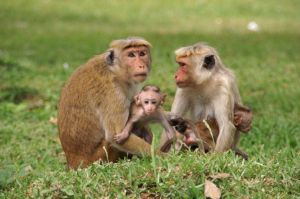
The Wildlife Department in Sri Lanka has pledged before the Court of Appeal that toque macaques (Macaca sinica) will not be exported to China. This promise was made when a writ petition, challenging a proposal to capture and export 100,000 of the monkeys to China, was filed in the Court of Appeal by 30 parties. The petitioners were wildlife and environmental groups, including Wildlife and Nature Protection Society of Sri Lanka and Rare Sri Lanka, as well as individual animal and wildlife advocates.
In April this year, Action for Primates reported that Sri Lanka was considering exporting 100,000 toque macaques to China. Toque macaques, who are native to Sri Lanka, are assessed as Endangered by the International Union for Conservation of Nature (IUCN) Red List, with a decreasing population trend. Threats to the species include habitat destruction, killing and persecution due to crop foraging and increasing negative human-wildlife interactions due to human activities. Action for Primates joined the international outcry by wildlife, environmental and conservation groups from around the world calling on the Sri Lankan government to reject this request from China, and instead to protect the Endangered macaques. Action for Primates had shared the concern of these groups that these monkeys may be destined for experiments, or killed to be eaten or for their body parts.
Thank you to everyone who supported our call to write to the authorities in Sri Lanka.
20 June 2023: BBC investigation exposes baby monkey torture groups
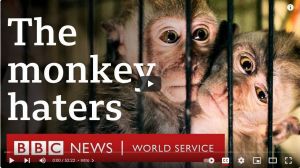
The BBC has carried out an investigation into the global monkey torture ring, focusing on Indonesia, the US and the UK, where hundreds of people meet to discuss and pay for extreme and sadistic torture to be carried out on baby monkeys in Indonesia and other Asian countries.
The BBC were able to track down the abusers in Indonesia, and the distributors and buyers in the US and the UK. They gained access to an international law enforcement effort to bring them to justice.
To watch the documentary: https://www.youtube.com/watch?v=fx_RttkSIzA
To read the article: https://www.bbc.co.uk/news/world-65951188
In Indonesia, two individuals responsible for unimaginable cruelty and abuse inflicted upon baby monkeys were convicted and imprisoned. In June 2023, the first charges were filed in the US against an individual involved in one of the monkey torture groups: charged with conspiring to engage in animal crushing and creating and distributing animal crush videos, creating animal crush videos, and illegally possessing a firearm as a dishonorably discharged person
(Oregon Man Indicted for Role in the Torture, Mutilation, and Murder of Monkeys). Another 24 are under investigation. In the UK, three people have been arrested. They were released under investigation.
Action for Primates and Lady Freethinker have been investigating the disturbing world of online monkey cruelty for three years. In 2021, we released our harrowing findings, revealing a disturbing escalation of violence and abuse directed at monkeys online. The evidence uncovered, including videos and screenshots of chats from members of this 'monkey torture group', were handed over to law enforcement agencies in several countries. We have also provided information and intelligence to the BBC journalists for their investigation and documentary.
Action for Primates and Lady Freethinker are continuing with their investigations, working with other groups such as Jakarta Animal Aid Network (JAAN) and Internet detectives, to track down individuals involved in these depraved activities. Although the abuse and filming has taken place primarily in Indonesia, there are also perpetrators in Cambodia and Malaysia. The audience, however, for the online cruelty content involving monkeys is global.
The easy accessibility of such content has put people, particularly children and other vulnerable groups, at risk and is likely to cause them considerable psychological distress and harm. It has also created and perpetuated an environment that normalises violence and provides a safe space for those people who enjoy this type of content. Lady Freethinker and Action for Primates, together with the Asia for Animals Social Media Animal Cruelty Coalition (SMACC), of which they are members, are calling on social media and video sharing platforms to take immediate action to stop the proliferation of animal torture content that is being posted online. We are also calling on the UK government to include harmful animal cruelty content within the scope of the Online Safety Bill.
16 June 2023: US law enforcement takes action against individual involved in online monkey torture
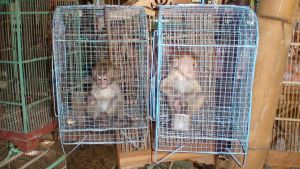
Action for Primates and Lady Freethinker have welcomed action taken by US law enforcement into the shocking and perverted underworld of 'monkey torture groups' following charges brought against an individual in Oregon. According to the court document, the individual ....is alleged to have knowingly conspired with others to view, encourage, and fund animal crush videos as part of an online group using an encrypted chat application
and ...paid for the creation of and celebrated videos depicting the torture, sexually-sadistic mutilation, and murder of adult and juvenile monkeys
(1).
Lady Freethinker and Action for Primates, with others, have been investigating the disturbing world of 'monkey torture groups' for over two years. The active and vocal monkey hatred community on social media platforms mainly targets long-tailed macaques in Southeast Asia, referring to the animals as tree rats
.
Harrowing findings released by us have revealed a disturbing escalation of cruelty and abuse online, with users primarily based in the US setting up private online groups on platforms like Telegram, and working with people in Indonesia to facilitate monkey torture videos. The evidence we have uncovered during the past two years includes videos and screenshots of chats from group members, who paid for baby monkeys to be abused, tortured, and killed while their terror and suffering was filmed for videos to be posted online. We provided this to US law enforcement.
Incredibly, many of these graphic videos have since been posted on social media platforms, including YouTube and Facebook, making them easily available for others, including children, to access and view. We are calling on social media and video sharing platforms to take immediate action to stop the proliferation of animal torture content that is being posted online.
Sarah Kite, Co-founder of Action for Primates, stated: We welcome the action taken by law enforcement. The torture and killing of baby monkeys for 'entertainment' must never be tolerated, let alone be filmed and distributed in any way. This action by law enforcement sends a clear message to those involved in these atrocities that there are consequences to their perverted and sadistic activities. We hope it will also cause social media platforms to start effectively monitoring and enforcing their own guidelines. Such cruelty is not the hallmark of a civilised society.
Nina Jackel, Founder of Lady Freethinker, stated: I applaud law enforcement for taking action to stop the horrific torture inflicted on innocent monkeys for profit. These videos, sold privately and also persistently shared on YouTube and other platforms, depict what is easily the worst animal cruelty I have seen in my years working for animal protection. The helpless baby macaques who suffered and died for these videos deserve justice.
Reference:
12 June 2023: The shameful global trade in wild-caught non-human primates continues
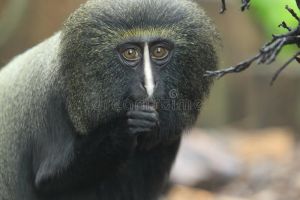
It is shocking that many countries still allow the cruel exploitation of their native non-human primates, and continue to grant CITES export permits for their capture from their natural habitats. The individuals, torn from their family and social groups, are shipped around the world for commercial purposes as part of the sickening legal trade in wildlife. Many of these individuals are likely to end up being sold into the 'pet' trade.
The capture of wild non-human primates is universally recognised by official bodies and organisations as inflicting significant suffering and distress. Non-human primates are highly social animals and trapping and removing them from their habitats, families and social groups is extremely cruel. It can also result in injuries or even death. The individuals taken will forever never be able to contribute to biodiversity, the local ecosystem or the genetic richness of the species.
Some data for 2022 have already been reported to CITES. These document wild-captured non-human primate species commercially traded around the world, including golden-bellied (Cercocebus chrysogaster) and black crested mangabeys (Lophocebus aterrimus), mona monkeys (Cercopithecus mona), mantled guerezas (Colobus guereza), green monkeys (Chlorocebus sabaeus), common patas monkeys (Erythrocebus patas), brown greater galagos (Otolemur crassicaudatus) and pottos (Perodicticus sp).
In 2022, the main country to report an export trade in wild-caught non-human primates for commercial purposes was the Democratic Republic of the Congo (DRC). Many species were exported, including several listed as Near Threatened, Vulnerable or Endangered on the IUCN Red List of Threatened Species with their populations in decline, such as L'Hoest's monkeys (Allochrocebus lhoesti), Hamlyn's monkeys (Cercopithecus hamlyni), black crested mangabeys and golden-bellied mangabeys. Allowing export for commercial purposes places additional pressure on species in the DRC, which are already facing threats from human activities such as habitat loss, hunting and the bushmeat trade. Other countries to export wild-caught monkeys are green monkeys by Sudan and patas monkeys, spot-nosed monkeys (Cercopithecus sp) and green monkeys by Ghana.
By far, the main importer of wild-caught monkeys for commercial purpose is Thailand, in particular from the DRC. In 2022, Thailand imported many species, including golden-bellied mangabeys, L'Hoest's monkeys, Wolf's mona monkeys (Cercopithecus wolfi), mantled guerezas and pottos. Other countries importing wild-caught monkeys include China, United Arab Emirates and Iraq.
Action for Primates recognises the important work carried out by the Thai wildlife authorities in relation to arresting wildlife traffickers in Thailand and rescuing monkeys who would otherwise be smuggled out of the country destined to become food or used in laboratories. We remain alarmed, however, by the great number of wild-caught non-human primates who Thailand allows to be imported, in particular from the DRC, including those on the International Union for Conservation of Nature (IUCN) Red List of threatened species, with declining populations.
Action for Primates appeals to Thailand, and other importing countries, to stop allowing wild-caught non-human primates to be imported into their countries. We also appeal to the governments of exporting countries, such as the DRC, to protect wild populations of non-human primates and not grant permits that allow them to be captured and exported for any reason.
6 June 2023: Canada disregards US import suspension, allowing hundreds of monkeys from Cambodia to be imported
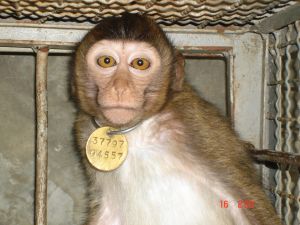
Action for Primates has joined with PETA to urge Canada to halt primate imports. An urgent letter has been sent to the Canadian Wildlife Service, Health Canada, the Canada Border Services Agency, and the Canadian Food Inspection Agency, informing them that hundreds of long-tailed macaques are being imported to Canada from Cambodia for use in laboratories and that the US Fish and Wildlife Service has suspended such imports to the US, following its federal monkey smuggling investigation and indictments.
According to international trade data, Canada imported monkeys worth $1.23 million from Cambodia after Cambodian government officials were indicted by the US Department of Justice in November 2022, for alleged smuggling. In February 2023, major importer Charles River Laboratories announced that it was suspending imports from Cambodia into the US. The Website of the Canadian government has not been updated on this matter since March, but insiders have told Action for Primates and PETA that hundreds of monkeys have arrived in Montréal in the past 30 days, transported by Hi Fly Malta and Bluebird Nordic.
The conservation status of the long-tailed macaque has recently been increased to Endangered by the International Union for the Conservation of Nature (IUCN) Red List. Threats facing the species include the global trade for research and toxicity (poisoning) testing. Furthermore, there are specific concerns regarding the trade in macaques from Cambodia. A federal investigation by the US authorities into the global trafficking of long-tailed macaques into the US resulted in charges being filed against Cambodian wildlife officials and others alleging that wild-caught long-tailed macaques imported by US companies were falsely stated to be captive-bred at Cambodian primate facilities.
Charles River Laboratories, which has Canadian facilities, has been served with a subpoena from the US Department of Justice in connection with its federal investigation into monkey trafficking, and currently more than 1,000 long-tailed macaques the company imported into the US from Cambodia are in limbo after the US Fish and Wildlife Service stopped their onward sale to laboratories.
6 May 2023: Animal Protection Groups Urge Ban on Mauritius Monkey Imports Following TB Outbreak
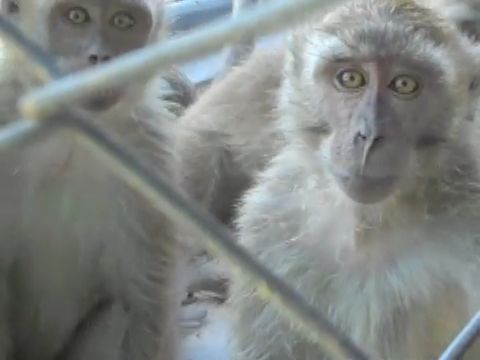
Action for Primates has joined with PeTA, Abolición Vivisección and One Voice in calling for a ban on the export of long-tailed macaques from Mauritius following a reported outbreak of tuberculosis (TB) at a monkey farm in the country.
The TB outbreak at one of the facilities that exports long-tailed macaques is just the latest fuel added to the ever-growing conflagration in the monkey abduction pipeline for the global research and toxicity (poisoning) testing industry. Any monkey testing positive for TB in this farm signals that there are likely many more, some of whom may have already been shipped to laboratories in the US, UK, Spain and France – all countries which regularly import long-tailed macaques from Mauritius. Animal groups have been sounding the alarm for years: confining hundreds of monkeys in crowded, unnatural conditions is not only inhumane, it inevitably spreads diseases and confounds research.
Tuberculosis is a highly infectious disease that can be transmitted between monkeys and people. Importantly, testing is not completely reliable, being complicated by false negatives. Due to the serious nature of the disease and lack of effective treatment, not only would monkeys testing positive for TB be killed, but also likely those others who reside in the same facility. If monkeys have been moved between facilities, this compounds the problem. Action for Primates, PeTA, Abolición Vivisección and One Voice are calling on the Mauritius government to stop exports of macaques and to governmental agencies in the US, UK, Spain and France to ban monkey imports from Mauritius.
Mauritius is one of the largest exporters of long-tailed macaques, including many captured from the wild. In 2022, almost 12,000 were sent overseas to suffer and die in laboratories in the US and Europe. In just one month already in 2023 – February – Mauritius exported 1,821 monkeys, with 1,306 going to the US.
Within just the past six months, hundreds of monkeys were seized by authorities in Mauritius after they were allegedly illegally captured; several US primate importers are under US federal investigation over questions about the origin of imported monkeys; long-tailed macaques are on the brink of extinction; and Cambodian officials and nationals have been indicted for alleged monkey trafficking.
There is only one solution to the situation. In the interests of public safety and compassion towards the monkeys, the international trade in non-human primates for laboratory use must end.
21 April 2023: Animal groups unite to urge Mauritius Prime Minister to release 446 confiscated monkeys
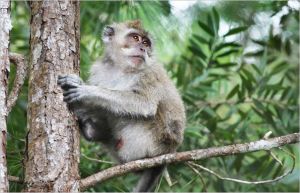
Animal Protection groups from the US, India and across Europe have joined Action for Primates in appealing to the Prime Minister of Mauritius to release the 446 long-tailed macaques who were confiscated by the authorities in March 2023, following the uncovering of an illegal trade in monkeys for the global research and toxicity (poisoning) testing industry. The organisations include PeTA (People for the Ethical Treatment of Animals), the world's largest animal organisation, with more than 9 million supporters, and Wildlife SOS in India, one of the largest wildlife organisations in SE Asia. Together with groups across Europe – One Voice (France), LAV (Italy), ADDA and Abolición Vivisección (Spain) and Doctors Against Animal Experiments (Germany) – they are asking for compassion to be shown to these macaques by returning them to the wild where they can reunite with their families.
The monkeys, who are reportedly being held at the Biosphere Trading facility, one of Mauritius's six primate export companies, face an uncertain future after being seized from appalling conditions in disused buildings in Jin Fei. There have been disturbing reports that the individual responsible for the capture and captivity of the 446 monkeys, has submitted a formal notice to the Ministry of Agro-industry and is trying to have the animals returned to him, in what could become a tug-of-war with the monkeys suffering in the middle. There are concerns that, after everything the monkeys have been through and suffered following their forced removal from their habitat and family and social groups, they could end up being returned to the person from whom they were confiscated, or be handed over to one of the macaque supply or export companies in Mauritius, to be used for breeding or exported directly to laboratories. We are also calling for information to be released on the current situation and housing of these 446 macaques, urging the authorities to allow a visit by a representative from an animal welfare group to the facility.
Sarah Kite, co-founder, Action for Primates: There is widespread global concern over the capture of wild monkeys, especially because of the cruelty and suffering caused by the forced removal of the animals from their natural habitat and family groups. Yet, in Mauritius, this inhumane practice continues and wild monkeys are captured for export to laboratories as well as for breeding facilities. These 446 long-tailed macaques have already suffered enough, and we appeal to the Prime Minister to order their release back to the wild where they belong.
Dr. Lisa Jones-Engel, primatologist at PeTA, stated: More than 28,000 (https://support.peta.org/page/50908/action/1?locale=en-US) PeTA supporters have contacted authorities in Mauritius, asking that an immediate, thorough and transparent investigation be conducted and that a representative of an animal protection group be allowed to assess the condition of these endangered long-tailed macaques. Allowing any individual or company to illegally abduct long-tailed macaques from their forest homes brings us one step closer to eradicating this entire species from the planet.
Muriel Arnal, president of One Voice: These 446 macaques saved from illegal trafficking must be released, and not sent to another farm specializing in animal experimentation in Mauritius, even if it were legal! Long-tailed macaques are endangered on the IUCN Red List. They must be allowed to return, free, to nature, and not be used as materials for laboratories in Europe, where more than a million European citizens have asked for these cruel methods to be stopped (ICE Save Cruelty Free Cosmetics), and where 74% of French people declare themselves in favor of a ban on animal experimentation (IPSOS/One Voice poll of April 2023).
The trade in long-tailed macaques in Mauritius has expanded in recent years, including an alarming revival in monkeys captured in the wild to be exported to non-human primate processing companies and laboratories in the US. Mauritius exported almost 12,000 macaques in 2022, including over 7,000 to the US, and almost 2,500 to Spain which has now become Europe's main importer of macaques from Mauritius. Most of the macaques exported to the US and Europe are destined to be used in controversial toxicity (poisoning) tests, one of the cruellest areas of animal testing and one that involves substantial suffering as monkeys are dosed with various drugs or chemicals to see if they cause illness. Monkeys surviving such tests are usually killed for further study.
Mauritius prides itself on being a paradise holiday destination, yet the appalling suffering that is inflicted upon our non-human primate cousins is at odds with what is presented in the glossy holiday brochures. The international reputation of Mauritius continues to be tarnished by its role in in the brutal global trade trade in monkeys' lives.
PeTA (US): https://www.peta.org/; Wildlife SOS (India): https://wildlifesos.org/; One Voice (France): https://one-voice.fr/; LAV (Italy): https://www.lav.it/; ADDA (Spain): https://www.addaong.org/es; Abolición Vivisección: https://www.abolicion-viviseccion.org/; Doctors Against Animal Experiments (Germany): https://www.aerzte-gegen-tierversuche.de/de/
12 April 2023: Concern for monkeys kept as 'pets' in Cambodia
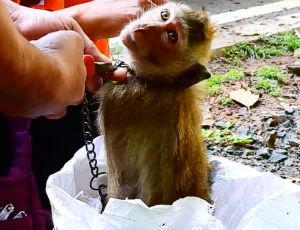
Action for Primates, Lady Freethinker and Stop Monkey Abuse Asia are extremely concerned to learn that four monkeys kept illegally as 'pets' in Cambodia, who were confiscated from a private household by the authorities in 2022, have reportedly been returned to the household eight months later. We are very disappointed this has happened, despite legislation that makes the private ownership of native wild animals in a residential home illegal, and we fear this may signal a relaxing of the current law.* By returning these four confiscated monkeys, the authorities are sending the wrong message – that keeping wild monkeys as 'pets' is acceptable, and that no action will be taken against anyone who does. We believe this will only encourage people to continue to steal wild baby monkeys from their mothers in the forests of Cambodia. It will also negatively impact wild populations of long-tailed macaques, the main non-human primate species kept as 'pets' and one whose conservation status was recently increased to Endangered by the IUCN Red List.
This lack of enforcement by the wildlife authorities will also encourage the irresponsible and dangerous trend in people abandoning 'pet' macaques at Angkor Wat, the UNESCO World Heritage Site in Siem Reap. These macaques, raised in human households and heavily dependent upon people, are being abandoned into the existing wild population at Angkor Wat, primarily to create a 'drama' or conflict situation by video operators to film for content to post on social media for 'Likes' and 'Views' on channels that are often monetised (https://tinyurl.com/4kzbwwzr; https://vimeo.com/798852217).
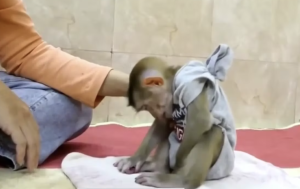
The keeping of baby monkeys in human households and raising them as 'pets' to use for online entertainment on social media platforms, such as YouTube and Facebook, has become a trend. These vulnerable infants, held captive under unnatural conditions, denied the protection of their mothers and family groups as well as their freedom, are paraded in front of the cameras, dressed in human baby clothes for 'Likes' and 'Views' on social media platforms that are often monetised. These helpless infants are often deliberately placed into frightening and distressing situations from which they cannot escape, and their stress, fear and terror are filmed for the online 'entertainment. The cruelty, torment and harm these baby monkeys are subjected to is heartbreaking and the lack of action by the Cambodian authorities and social media platforms, such as Facebook and YouTube, is shocking (https://tinyurl.com/3wz2batj; https://vimeo.com/701323086).
Lady Freethinker, Action for Primates and Stop Monkey Abuse Asia urge Cambodian officials to enforce the legislation against the keeping of monkeys in private homes and to confiscate any illegally held captive monkeys so that they may be relocated to a reputable sanctuary where they may be rehabilitated for release to their natural homes or can at least live the rest of their lives in peace.
Cambodia wildlife legislation (Forestry Law (2002)) states that the private ownership of native wild animals in a residential home is illegal. Article 50:
"It is prohibited to commit the following activities against common wildlife species, except by a permit issued by the Forestry Administration: 1) Stock or maintain as a zoo or in a family house;"
5 April 2023: EU must live up to promise to dissociate itself from the wild-caught primate trade
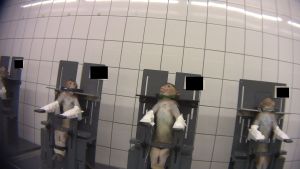
Action for Primates is extremely disappointed by the conclusion of a study that a move to sourcing non-human primates only from self-sustaining colonies for use in research and toxicity (poisoning) testing in EU laboratories is unlikely to be achievable in the foreseeable future. This study is likely to lead the way for non-human primates to continue to be imported from companies that abduct these individuals from the wild. The Feasibility study was carried out under Article 10 of Directive 2010/63/EU, and is contrary to what was expected from the revision of the Directive, in which provisions were introduced with the objective of phasing out the capture of animals from the wild, including for purposes of breeding. The original Directive recognised that:
The capture of non-human primates from the wild is highly stressful for the animals concerned and carries an elevated risk of injury and suffering during capture and transport. In order to end the capturing of animals from the wild for breeding purposes, only animals that are the offspring of an animal which has been bred in captivity, or that are sourced from self-sustaining colonies, should be used in procedures after an appropriate transition period. A feasibility study should be carried out to that effect and the transition period adopted if necessary. The feasibility of moving towards sourcing non-human primates only from self-sustaining colonies as an ultimate goal should also be examined.(EU 2010)
The wild-caught trade in non-human primates for research and toxicity testing is a practice widely condemned for its cruelty and suffering (IPS 2021). A feasibility study was carried out in 2017 (CIRCABC 2017). From this, a requirement was proposed for Member States to use only non-human primates who are the offspring of animals who themselves had been bred in captivity, or who are sourced from self-sustaining colonies. This was expected to be introduced in November 2022.
The results of a second feasibility study have now been published with the following conclusion:
At this time, it is not possible to determine if or whether the aspiration of sourcing from self-sustaining colonies will be achieved in the future, but with the recent changes in usage, availability, demand and breeding practices in some centres, it is unlikely to be achieved for all commonly used non-human primate species in the foreseeable future.(CIRCABC 2022)
Dr Nedim Buyukmihci, veterinarian and Action for Primates spokesperson, responded to this conclusion:
The failure to require that non-human primates are only sourced from self-sustaining colonies would be a major setback for animal welfare, morality and public safety due to the increased risk of zoonotic disease. The trade in wild-caught non-human primates is a practice that is universally acknowledged to be cruel, subjecting the individuals to substantial suffering and distress, as well as further compromising the already contentious issue of scientific credibility of research using these individuals. Non-human primates are highly social animals and trapping and removing them from their habitats, families and social groups, constitutes particularly inhumane and brutal treatment. It also results in injuries and death during capture. The individuals taken will forever be prevented from contributing to biodiversity, the local ecosystem or the genetic richness of the species. By allowing the continued importation of non-human primates from non self-sustaining colonies, including the offspring of wild-caught individuals to be used in laboratories, the EU would be enabling this cruel and immoral practice to continue.
Of greatest concern are the important moral and welfare considerations regarding the use of non-human primates in research and toxicity (poisoning) testing. There is an increasing awareness and acceptance that the substantial cognitive abilities and social behaviour and needs of most non-human primate species makes it likely that they will suffer substantially by being experimented upon in captivity. Experts in the field have proposed that we no longer use these species in research that is invasive (Padrell et al 2021, which is the bulk of the research and testing being done currently. The research industry itself professes to be concerned and claims that these species are only used in life-saving research and that ending a reliance on them should be the goal. Yet, the feasibility study did not appear to take any of this important information into consideration. Allowing a continued reliance on the wild-caught trade is at odds with the internationally established principles of replacement, reduction and refinement (NC3Rs). A requirement to use only captive bred non-human primates is still fraught with moral and welfare problems, but it would be a start on the responsible road to eliminate their use entirely.
The International Primatological Society recognises that trade in live primates, both legal and illegal, is a major threat to nonhuman primate conservation ... the capture of nonhuman primates from the wild is stressful for the animals and increases the suffering, risk of injuries, spread of disease and even death during capture, storage and transport.
(IPS 2021)
The main non-human primates species used in EU laboratories is the long-tailed macaque (Macaca fascicularis). This species accounted for 88% of non-human primates used in 2020, per the latest data available. Individuals are imported from Mauritius and Vietnam. The commercial trade in capturing wild long-tailed macaques for breeding and export has recently resumed in Mauritius. According to data reported to CITES, 5,499 long-tailed macaques were imported into the EU during 2020 (CITES Trade Database).
In 2022, the long-tailed macaque was assessed as Endangered by the International Union for Conservation of Nature (IUCN) Red List of Threatened Species. The IUCN assessment was based on the current degree of exploitation of the species, driven in particular by the global trade in long-tailed macaques for research and toxicity (poisoning) testing. (Hansen et al 2022)
References:
20 March 2023: Researchers from Europe and Canada involved in deadly baboon experiment in Kenya
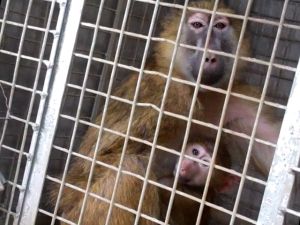
Researchers from the Netherlands (Maastricht University), Belgium (Leuven University) and Canada (Université Laval and CHU de Québec Research Center) collaborated in this research which involved the killing of fifteen baboons. The experiment took place at the Institute of Primate Research (IPR) in Nairobi, Kenya (Poirier et al 2022). The project was funded by the Canadian Institutes of Health (grant number PJT-153 184), but reviewed by the Institutional Review Committee and the Institutional Animal Care and Use Committee at the IPR. The Canadian researchers declared a competing interest having ownership interest in a patent for 17β-HSD inhibitors, one of the test treatments.
model
for the condition seen in women, prior to the test treatment being used in clinical trials. The IPR has previously used baboons as surrogates in human reproduction research, including that involving inducing endometriosis. Endometriosis is a very painful condition caused by the presence of endometrial (uterine) tissues in the peritoneal cavity (a membrane that lines the inside of the abdomen and pelvis). Also tested was the effect of an irreversible inhibitor (a molecule named PBRM) on endometrial tissue obtained at the Maastricht University Medical Centre from female human patients with endometriosis.
Action for Primates has joined with Animal Rights in condemning this deadly experiment, as well as seeking clarification on whether wild-caught baboons were used. There was no mention about the source or age of the baboons. Historically, the IPR has captured wild baboons to use in its laboratories. A statement that appeared in an earlier paper from the IPR suggests why no age was provided for the baboons used in the current work: It should be noted that the baboons used for research at IPR are trapped from the wild and therefore it is difficult to determine their exact age.
(Nyachieo et al 2011). Regardless of the source, however, there was also no mention of the conditions under which these fifteen individuals were kept.
Fifteen adult female olive baboons (Papio anubis), weighing 12-16 kg and maintained in captivity at IPR, were used to create endometriosis artificially. Although the precise methods used – including whether anaesthesia was used – were not mentioned in the article, it was clear that portions of each baboon's uterus tissue (endometrium) were excised and then injected back into the same baboon's abdominal cavity. The baboons were also subjected to multiple episodes of laparoscopy (examination of the abdominal cavity using an endoscope), once again without any mention of anaesthesia or sedation. The treatment was given orally by gavage (the use of a tube forced down the throat into the stomach), six days a week, once again without any mention of anaesthesia or sedation. The study lasted five months, after which time all the baboons were killed. The biochemical findings were not substantially different from those in the human part of the experiment.
Three other adult female olive baboons were also used to evaluate the distribution of the test substance and to see if it was toxic. The latter was claimed not to be the case.
The work on baboons represented the first such study that has taken place, and it is disturbing that the authors argued for a second study to take place.
Action for Primates has previously reported on disturbing womb transplantation research involving baboons by the IPR, which caused substantial suffering and in which three of the individuals died immediately after surgery (Baboons used as both donor and recipient in disturbing womb transplantation research).
Action for Primates believes that abducting baboons from their homes and then using them in 'research' can never be justified. The human species is intelligent and resourceful enough so that other humane and human-relevant ways of providing the kind of information desired to improve human welfare and well-being can be obtained without having to purposefully cause immense suffering, misery and death in others.
References:
24 February 2023: Charles River Laboratories receives subpoena over macaque supply
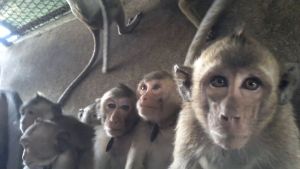
Charles River Laboratories (CRL), the global contract testing company, has received a subpoena from the US Department of Justice (DOJ) in connection with an investigation into the supply of non-human primates from Cambodia for research and toxicity (poisoning) testing. Shares in CRL dropped following this announcement. The company also stated that it had voluntarily suspended shipments of long-tailed macaques from Cambodia.
In November 2022, indictments were filed against Cambodian wildlife officials and the owner and staff at one macaque supply company – Vanny Bio Research (Cambodia) Corporation Ltd – in relation to illegally importing long-tailed macaques into the US. The charges were made following a major investigation by the US authorities into the global trafficking of long-tailed macaques into the US. The DOJ alleged that the individuals involved are part of an international primate smuggling ring selling wild-caught macaques falsely stated to be captive bred at Cambodian facilities for export to the US and elsewhere, and who provided falsified CITES export permits.
In 2022, Orient BioResource Center and Envigo Global Services received subpoenas from the US Attorney's Office in Florida, requiring they produce documents and information relating to the import of non-human primates into the US. Both companies, acquired by Inotiv in 2021, were regular importers of long-tailed macaques from Cambodia. Inotiv has also announced a suspension of macaque imports from Cambodia.
Action for Primates has been raising concerns about the inhumanity and suffering inflicted by the global trade upon long-tailed macaques – the plundering of wild populations, their captivity and air transportation as cargo, as well as questioning the validity of captive breeding claims. The rapid development and expansion of long-tailed macaque farms focused within South East Asia, in particular in Cambodia, has resulted in an industrialised scale enterprise, with hundreds of thousands of macaques exported in recent years.
![]()
![]()
![]()
![]()
![]()
Contact us via E-mail
Copyright © 2020-2026 Action for Primates. All rights reserved.